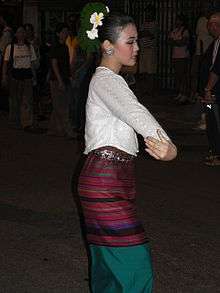ยวน
Thai

Northern Thai girl in traditional dress performing a traditional dance.
Pronunciation
| Orthographic/Phonemic | ยวน y w n | |
| Romanization | Paiboon | yuuan |
| Royal Institute | yuan | |
| (standard) IPA(key) | /jua̯n˧/ | |
| Homophones | ญวน | |
Alternative forms
- เยาวนะ
- โยน (yoon)
- โยนก
Adjective
ยวน • (yuuan)
- (historical) Ionian.
- (historical) of or pertaining to Singhanavati, an ancient polity in modern-day Northern Thailand, or to its people, language(s), or culture.
- (historical) of or pertaining to Lan Na, an ancient polity in modern-day Northern Thailand, or to its people, language(s), or culture.
- (somewhat derogatory) of or pertaining to Northern Thailand, Northern Thai people, Northern Thai language, or Northern Thai culture.
Noun
ยวน • (yuuan)
- (historical) Ionian.
- (historical) member of a people of Singhanavati, an ancient polity in modern-day Northern Thailand.
- (historical) member of a people of Lan Na, an ancient polity in modern-day Northern Thailand.
- (somewhat derogatory) Northern Thai person.
Proper noun
ยวน • (yuuan)
- (historical) Ionia.
- (historical) Singhanavati, an ancient polity in modern-day Northern Thailand.
- (historical) Lan Na, an ancient polity in modern-day Northern Thailand.
- (somewhat derogatory) Northern Thailand.
Etymology 2
Of uncertain origin.
Verb
ยวน • (yuuan) (abstract noun การยวน)
Derived terms
- ยั่วยวน
- ยียวน
This article is issued from
Wiktionary.
The text is licensed under Creative
Commons - Attribution - Sharealike.
Additional terms may apply for the media files.